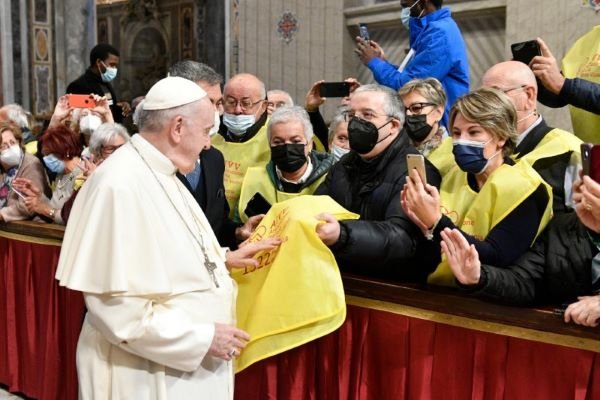Dear brothers and sisters, good morning!
Last Wednesday we began a cycle of catecheses on Saint Joseph – the year dedicated to him is coming to an end. Today we will continue this journey, focusing on his role in salvation history.
Jesus in the Gospels is indicated as the “son of Joseph” (Lk 3:23; 4: 22; Jn 1:45; 6:42) and the “carpenter’s son” (Mt 13:55; Mk 6:3). Narrating Jesus’ childhood, the Evangelists Matthew and Luke dedicate space to the role of Joseph. Both of them compile a “genealogy” to highlight the historicity of Jesus. Addressing himself above all to the Judeo-Christians, Matthew starts from Abraham and ends up at Joseph, defined as "the husband of Mary, of whom Jesus was born, who is called Christ” (1:16). Luke, on the other hand, goes all the way back to Adam, beginning directly with Jesus, who "was the son of Joseph", but specifies: “as was supposed” (3:23). Therefore, both Evangelists present Joseph not as the biological father, but in any case, as fully the father of Jesus. Through him, Jesus fulfils the history of the covenant and salvation between God and humanity. For Matthew this history begins with Abraham; for Luke, with the very origin of humanity, that is, with Adam.
The evangelist Matthew helps us to understand that the person of Joseph, although apparently marginal, discreet, and in the background, is in fact a central element in the history of salvation. Joseph lives his role without ever seeking to take over the scene. If we think about it, “Our lives are woven together and sustained by ordinary people, people often overlooked. People who do not appear in newspaper and magazine headlines. … How many fathers, mothers, grandparents and teachers are showing our children, in small ways, and in everyday ways, how to accept and deal with a crisis by adjusting their routines, looking ahead and encouraging the practice of prayer. How many are praying, making sacrifices and interceding for the good of all” (Apostolic Letter Patris corde, 1). Thus, everyone can find in Saint Joseph, the man who goes unnoticed, the man of daily presence, of discreet and hidden presence, an intercessor, a support and a guide in times of difficulty. He reminds us that all those who are seemingly hidden or in the “second row” are unparalleled protagonists in the history of salvation. The world needs these men and women: men and women in the second row, but who support the development of our life, of every one of us, and who with prayer, and by their example, with their teaching, sustain us on the path of life.
In the Gospel of Luke, Joseph appears as the guardian of Jesus and of Mary. And for this reason, he is also “the Guardian of the Church”: but, if he was the guardian of Jesus and Mary, he works, now that he is in heaven, and continues to be a guardian, in this case of the Church, for the Church is the continuation of the Body of Christ in history, even as Mary’s motherhood is reflected in the motherhood of the Church. In his continued protection of the Church – please do not forget this: today, Joseph protects the Church – and by continuing to protect the Church, he continues to protect the child and his mother” (ibid., 5). This aspect of Joseph’s guardianship is the great answer to the story of Genesis. When God asks Cain to account for Abel's life, he replies: “Am I my brother's keeper?” (4: 9). With his life, Joseph seems to want to tell us that we are always called to feel that we are our brothers and sisters’ keepers, the guardians of those who are close to us, of those whom the Lord entrusts to us through many circumstances of life.
A society such as ours, which has been defined as “liquid”, as it seems not to have consistency… I will correct the philosopher who coined this definition and say: more than liquid, gaseous, a properly gaseous society. This liquid, gaseous society finds in the story of Joseph a very clear indication of the importance of human bonds. Indeed, the Gospel tells us the genealogy of Jesus, not only for a theological reason, but also to remind each one of us that our lives are made up of bonds that precede and accompany us. The Son of God chose to come into the world by way of such bonds, the way of history: he did not come down into the world by magic, no. He took the historic route we all take.
Dear brothers and sisters, I think of the many people who find it difficult to find meaningful bonds in their lives, and because of this they struggle, they feel alone, they lack the strength and courage to go on. I would like to conclude with a prayer to help them, and all of us, to find in Saint Joseph an ally, a friend and a support.
Saint Joseph,
you who guarded the bond with Mary and Jesus,
help us to care for the relationships in our lives.
May no one experience that sense of abandonment
that comes from loneliness.
Let each of us be reconciled with our own history,
with those who have gone before,
and recognise even in the mistakes made
a way through which Providence has made its way,
and evil did not have the last word.
Show yourself to be a friend to those who struggle the most,
and as you supported Mary and Jesus in difficult times,
support us too on our journey. Amen.
